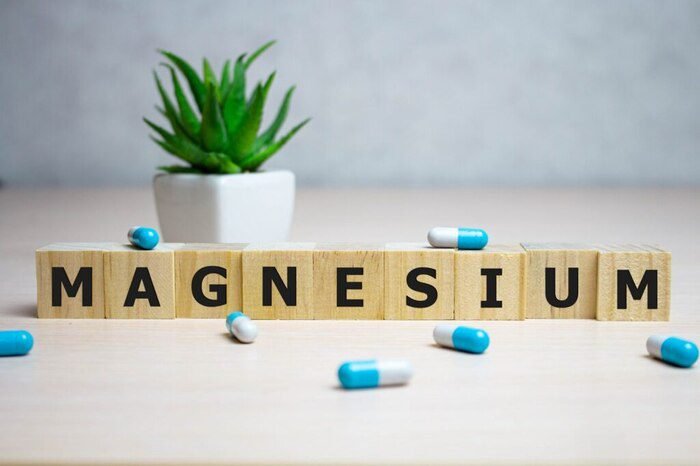Magnesium plays a key role in supporting a woman’s health by strengthening the immune system, keeping blood sugar stable, and maintaining strong bones. It also helps muscles and the nervous system function properly.
Many women use Magnesium supplements to ease symptoms of premenstrual syndrome (PMS), pelvic pain, and menopause. These supplements are also commonly taken to help with headaches, migraines, anxiety, and sleep issues. While some women find them beneficial, more research is needed to fully understand how effective they are and how they work in the body.
How does magnesium work?
Magnesium is essential for healthy bone growth and maintenance. It also plays a key role in the proper functioning of nerves, muscles, and various other systems in the body. In the stomach, magnesium helps neutralize acid and supports digestion by moving stools through the intestines.
Where can you get ?
can be found in several foods, such as:
- Green leafy vegetables like spinach
- Legumes such as peas and beans
- Nuts, including Brazil nuts and almonds
- Seeds like hemp, pumpkin, and linseeds
- Whole grains
You can also get magnesium from water, including mineral and bottled water. However, the magnesium content varies based on the source and brand.
Potential Benefits for Exercise Performance
During exercise, your body may require more magnesium compared to when you’re at rest, depending on the type of activity. plays a crucial role in transporting blood sugar to your muscles and helps eliminate lactate, a byproduct of exercise that can lead to fatigue.
Research indicates that magnesiu supplements might be particularly beneficial for enhancing exercise performance, especially in older adults or those with magnesium deficiencies. For instance, one study involving 2,570 women found a correlation between higher magnesium intake and increased muscle mass and strength.
Additionally, a 2019 study demonstrated that professional male cyclists who took 400 mg of magnesium daily for three weeks showed improved muscle recovery and reduced muscle damage after a strenuous race, compared to those who received a placebo.
However, further research is necessary, as some studies suggest that athletes or active individuals with sufficient magnesiu levels may not see additional benefits from supplementation.

How to Ensure You Get Enough Magnesium
Most people can meet their magnesium needs through their diet. For example, eating 30 grams of pumpkin seeds, chia seeds, or almonds provides enough magnesium for a woman’s daily requirement. Half a cup of steamed spinach gives about a quarter of what’s needed each day.
Pregnant women have slightly higher magnesium needs.
If you’re considering supplements, it’s important to talk to your doctor first, as they can interfere with certain medications or health conditions. Also, follow the recommended dosage carefully—taking too much can cause stomach cramps, diarrhea, and nausea.
Premenstrual Syndrome (PMS)
Conditions like PMS and PCOS can arise from hormonal imbalances or fluctuations in blood sugar levels. Magnesium can help alleviate these symptoms by promoting normal hormone production and assisting insulin in transporting blood glucose to cells.
Menopause
Menopause involves a decrease in progesterone and estrogen levels, leading to the end of menstruation. This transition can be made more difficult by a lack of essential nutrients needed for hormone production. Therefore, adequate magnesium intake, along with vitamin B6 and healthy fats, is crucial.
Moreover, magnesium can help alleviate menopause-related symptoms, such as mood swings, stress management, and high blood pressure. When combined with calcium, magnesium also supports bone mineral density, which is vital for preventing osteoporosis and reducing the risk of fractures.
Stress Management and Detoxification
In today’s fast-paced world, stress is a common issue, and magnesium is essential for managing stress alongside vitamins B5, B6, and C.
When planning for conception, it’s important to focus on a diet rich in antioxidant nutrients and support the body’s detoxification processes. Magnesium aids in detoxification, helping to eliminate toxins that can interfere with hormonal balance, brain function, and digestion.
To support its many functions in the body, Public Health England recommends that adults aim for a daily intake of 300 mg of magnesium.
Deficiency
Magnesium deficiency is rare in otherwise healthy individuals with low dietary intake because the kidneys effectively regulate the excretion of this mineral. However, consistently low magnesium intake or excessive losses—often due to certain medical conditions, chronic alcoholism, or specific medications—can lead to deficiency.
Early symptoms of magnesium deficiency may include a reduced appetite, nausea, vomiting, fatigue, and weakness. As the deficiency progresses, individuals might experience numbness, tingling, muscle cramps and contractions, seizures, mood changes, irregular heart rhythms, and coronary spasms. In severe cases, magnesium deficiency can lead to hypocalcemia or hypokalemia, which are characterized by low levels of serum calcium or potassium, respectively, due to disrupted mineral balance.
Potential Support for Healthy Blood Sugar Levels
Research indicates that nearly 48% of individuals with type 2 diabetes have low magnesium levels, which may hinder the body’s ability to effectively manage blood sugar levels. Moreover, studies show that higher intake is associated with a reduced risk of developing type 2 diabetes.
A review of the literature found that supplements can improve insulin sensitivity, an important aspect of maintaining stable blood sugar levels. Additionally, another review noted that these supplements helped enhance blood sugar control and insulin sensitivity in individuals at risk for type 2 diabetes.
Potential Benefits for Heart Health
A 2021 review highlighted that magnesium supplements can help reduce high blood pressure, a known risk factor for heart disease.
Additionally, another review found that higher magnesium intake is associated with a lower risk of heart disease, stroke, and hypertension.
Furthermore, one study reported that supplements improved several heart disease risk factors, including triglycerides, LDL (bad) cholesterol, HDL (good) cholesterol, and systolic blood pressure, particularly in individuals with magnesium deficiency.
However, further research is necessary, as some studies have shown no significant impact of magnesium on cholesterol or triglyceride levels.

